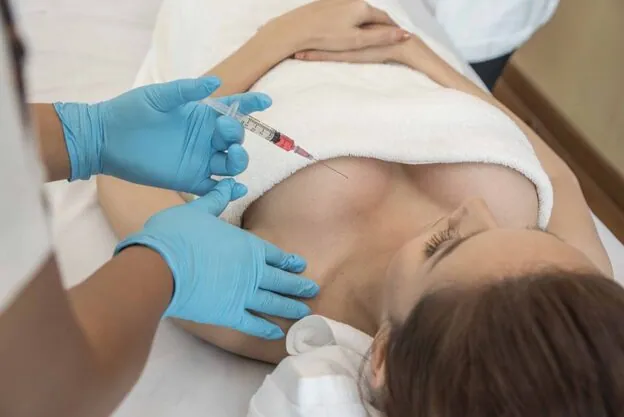
What to Ask Your Surgeon Before Breast Reduction Surgery
Breast reduction surgery, also known as reduction mammaplasty, is a life-changing procedure that can provide relief to those who suffer from the physical and emotional burdens of excessively large breasts.
Breast reduction surgery, also known as reduction mammaplasty, is a life-changing procedure that can provide relief to those who suffer from the physical and emotional burdens of excessively large breasts. While the decision to undergo breast reduction is a significant one, choosing the right surgeon is equally crucial. To ensure a safe and successful outcome, it is essential to ask your breast reduction surgeon a series of important questions. In this article, we will delve into the most critical inquiries you should pose to your surgeon before undergoing the procedure.
Are You Board-Certified?
One of the first and most critical questions you should ask your breast reduction surgeon is whether they are board-certified in plastic surgery. Board certification indicates that the surgeon has met rigorous training and ethical standards in the field. It ensures that your surgeon has the necessary expertise to perform the surgery safely and effectively.
How Much Experience Do You Have with Breast Reduction Surgery?
Experience is a vital factor when choosing a surgeon for any procedure. Ask your surgeon about their experience with breast reduction surgery, including the number of procedures they have performed. The more experienced a surgeon is, the more likely they are to have encountered various scenarios and complications, making them better equipped to handle your specific case.
Can I See Before-and-After Photos of Your Previous Patients?
Before committing to breast reduction surgery, it is crucial to assess the surgeon's previous work. Request to see before-and-after photos of patients with similar breast size and body type as yours. This will give you a better understanding of the surgeon's skill and the potential results you can expect.
What Are the Different Surgical Techniques for Breast Reduction?
Breast reduction surgery can be performed using various techniques, such as the anchor, vertical, or lollipop method. Each method has its advantages and potential drawbacks, and the best one for you depends on your specific needs and goals. Ask your surgeon to explain the different techniques and recommend the most suitable one for your case.
What Are the Risks and Complications Associated with Breast Reduction Surgery?
Every surgical procedure comes with potential risks and complications. It is essential to have a thorough understanding of these risks before making your decision. Your surgeon should be able to explain the potential complications, such as infection, scarring, changes in nipple sensation, and the need for revision surgery, as well as how they plan to mitigate them.
Can You Walk Me Through the Preoperative and Postoperative Care Instructions?
A successful breast reduction surgery requires careful preparation and postoperative care. Your surgeon should provide you with detailed preoperative and postoperative care instructions, including what to do before the surgery, medications to avoid, and the steps you should take during recovery. Knowing what to expect and how to care for yourself will help ensure a smoother healing process.
What Type of Anesthesia Will Be Used?
Understanding the type of anesthesia used during your surgery is crucial. Ask your surgeon about the anesthesia options available, whether it will be general or local anesthesia with sedation. Additionally, inquire about the qualifications of the anesthesiologist who will be administering the anesthesia.
What Will the Scarring Look Like?
Scarring is an inevitable part of any surgery. However, the extent and visibility of scarring can vary based on the surgical technique used and how well you follow postoperative care instructions. Ask your surgeon about the location and appearance of scars, and discuss any concerns you may have regarding scarring.
What Is the Expected Recovery Time?
Understanding the expected recovery time is essential for planning your post-surgery schedule. Your surgeon should provide you with a rough estimate of how long it will take to resume normal activities and when you can expect to see the final results. Keep in mind that individual recovery experiences may vary.
Will I Be Able to Breastfeed After the Procedure?
If you plan to have children in the future and are concerned about breastfeeding, it's essential to discuss this with your surgeon. While breast reduction surgery may affect your ability to breastfeed, your surgeon can provide guidance on preserving milk ducts and nipple sensitivity to increase the chances of successful breastfeeding after the procedure.
How Much Will the Surgery Cost, and What Does the Fee Include?
Cost is an important factor to consider when planning for breast reduction surgery. Ask your surgeon for a detailed breakdown of the fees, including the surgeon's fee, anesthesia, facility fees, and any potential additional costs. Ensure that you have a clear understanding of what is included in the total cost and whether any follow-up appointments or revisions are covered.
Do You Accept Insurance, and Is My Procedure Covered?
In some cases, breast reduction surgery may be considered medically necessary due to physical discomfort or health issues caused by large breasts. If this is the case, your health insurance may cover a portion of the surgery. Consult with your surgeon's office to determine whether they accept insurance and if your specific procedure qualifies for coverage.
Can You Provide References or Patient Testimonials?
Asking for references or reading patient testimonials can offer valuable insights into the surgeon's reputation and patient satisfaction. Hearing from individuals who have undergone breast reduction surgery with the same surgeon can help you gain confidence in your choice.
What Are Your Facility's Accreditation and Safety Protocols?
Ensure that the surgical facility where your procedure will take place is accredited and meets all safety standards. Your surgeon should be transparent about the facility's credentials and the precautions taken to ensure patient safety during the surgery.
What Are Realistic Expectations for the Results?
While breast reduction surgery can provide significant relief and improve your quality of life, it's essential to have realistic expectations. Your surgeon should explain what the procedure can and cannot achieve and discuss the potential limitations based on your unique circumstances.
Can I Bring a Support Person on the Day of Surgery?
Many patients find it comforting to have a support person with them on the day of surgery. Discuss with your surgeon whether you can have someone accompany you to the facility and any restrictions or guidelines for their involvement.
What Is the Follow-up and Revision Policy?
In the event that you are not satisfied with the results or experience complications, it's essential to know the surgeon's policy regarding follow-up appointments and potential revisions. Ask about the surgeon's commitment to your long-term care and any associated costs.
How Do You Handle Emergency Situations?
While rare, emergencies can occur during surgery. Your surgeon should have a clear plan in place to address such situations, including access to emergency medical care and communication with your support person or family members.
What Are Your Credentials and Educational Background?
Understanding your surgeon's credentials and educational background can provide additional confidence in their expertise. Inquire about their medical degree, residency training, and any specialized training in plastic surgery.
Can You Describe the Consultation Process in Detail?
The initial consultation with your surgeon is a crucial step in your decision-making process. Ask your surgeon to explain what the consultation involves, including a physical examination, a discussion of your goals, and the development of a personalized surgical plan. It is also a chance for you to ask any remaining questions you may have.
While the questions mentioned in the article are crucial to ask your breast reduction surgeon, there are a few additional considerations and topics you may want to explore when discussing the procedure. Here are some supplementary points to consider:
Surgical Plan Customization:
Ask your surgeon how they plan to tailor the procedure to your specific needs and aesthetic goals. Understanding the level of customization and personalization involved in your surgery is essential.
Post-Surgery Scarring Minimization:
In addition to understanding the appearance of scars, inquire about techniques or products that can help minimize scarring after the procedure, such as scar creams or silicone sheets.
Pain Management:
Discuss the postoperative pain management plan, including the type of pain medication prescribed and the surgeon's approach to minimizing discomfort during recovery.
Long-term Follow-up:
Ensure you have a clear understanding of the surgeon's follow-up schedule. Regular postoperative visits are essential to monitor your healing progress and address any concerns that may arise.
Weight Stability:
Your surgeon may discuss the importance of achieving and maintaining a stable weight before surgery, as significant weight fluctuations can affect the results.
Surgical Timing:
Ask your surgeon about the best time for your breast reduction surgery, taking into account factors like age, future family planning, and overall health.
Real Patient Stories:
Request to speak with previous patients who have undergone the procedure. Hearing about their personal experiences and outcomes can provide valuable insights.
Body Image and Emotional Well-being:
Discuss the potential emotional and psychological aspects of breast reduction surgery. Your surgeon should address how the procedure may impact your self-esteem and body image.
Alternatives to Surgery:
It's important to explore non-surgical options for addressing concerns related to breast size and shape, as breast reduction surgery is not the only solution. Your surgeon should discuss alternative treatments if they are applicable to your case.
Consent and Informed Decision:
Understand the process for informed consent, which includes reviewing and signing documents that outline the risks, benefits, and alternatives of the procedure. Ensure you have ample time to make a well-informed decision.
Recovery Support:
Discuss the importance of having a reliable support system during your recovery, whether it's family, friends, or a professional caregiver.
Legal and Ethical Questions:
If you have specific legal or ethical concerns, such as the use of implants, tissue removal, or any potential ethical dilemmas, address these issues with your surgeon to ensure your values and beliefs are respected.
You can save time and effort by contacting leading surgeons in India through a quick email or WhatsApp message via our website.
Conclusion
Choosing to undergo breast reduction surgery is a significant decision that can have a profound impact on your physical and emotional well-being. Selecting the right surgeon is essential to ensure a safe and successful procedure. By asking these essential questions, you can gain a better understanding of your surgeon's qualifications, the procedure, and what to expect during the process. While the initial questions provided in the article are comprehensive, each patient's situation is unique, and it's essential to have a candid and thorough discussion with your surgeon to cover all aspects of the breast reduction surgery process. Your surgeon should be willing and able to address all your concerns, so you feel well-prepared and confident in your decision to undergo the procedure. Remember that open and honest communication with your surgeon is the key to a successful and satisfying breast reduction experience.


Comments
Login & Write comment